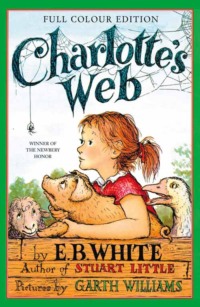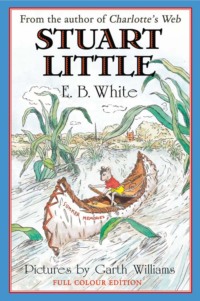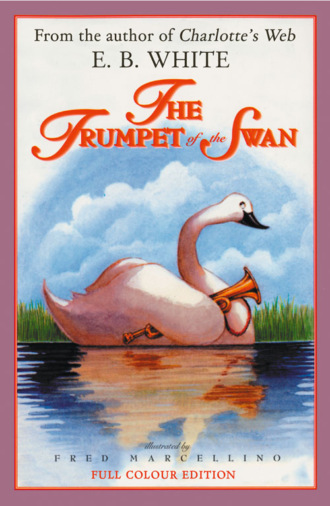
Полная версия
The Trumpet of the Swan

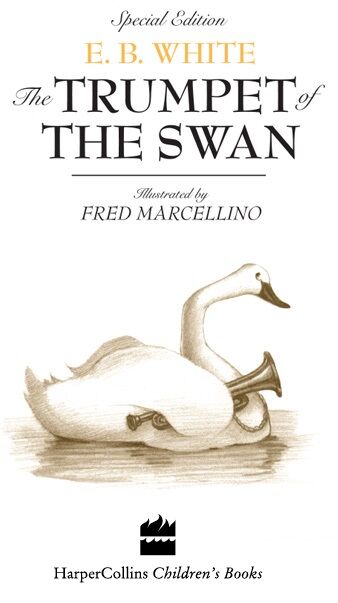
Copyright
HarperCollins Children’s Books
A division of HarperCollinsPublishers Ltd.
1 London Bridge Street
London SE1 9GF
www.harpercollins.co.uk
First published in the USA by Harper Row, Publishers, Inc., New York, 1970
First published in Great Britain by Hamish Hamilton Children’s Books Ltd, 1970
This ebook edition first published in Great Britain by HarperCollins Children’s Books, 2015
Text copyright © E.B. White, 1970
Illustration copyright © Fred Marcellino, 2000
E.B. White and Fred Marcellino assert the moral right to be identified as the author and illustrator of this work.
A catalogue record for this book is available from the British Library
All rights reserved under International and Pan-American Copyright Conventions. By payment of the required fees, you have been granted the nonexclusive, nontransferable right to access and read the text of this ebook on-screen. No part of this text may be reproduced, transmitted, downloaded, decompiled, reverse-engineered, or stored in or introduced into any information storage and retrieval system, in any form or by any means, whether electronic or mechanical, now known or hereafter invented, without the express written permission of HarperCollins ebooks
HarperCollinsPublishers has made every reasonable effort to ensure that any picture content and written content in this ebook has been included or removed in accordance with the contractual and technological constraints in operation at the time of publication.
Ebook Edition © MARCH 2015 ISBN: 9780008139438
Version: 2016-08-26
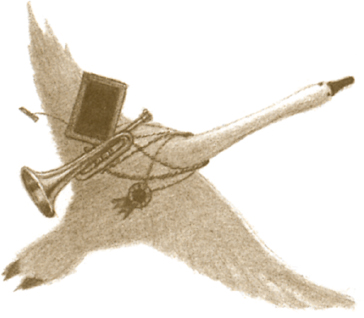
Contents
Cover
Title Page
Copyright
1 Sam
2 The Pond
3 A Visitor
4 The Cygnets
5 Louis
6 Off to Montana
7 School Days
8 Love
9 The Trumpet
10 Money Trouble
11 Camp Kookooskoos
12 A Rescue
13 End of Summer
14 Boston
15 A Night at the Ritz
16 Philadelphia
17 Serena
18 Freedom
19 A Talk about Money
20 Billings
21 The Greening Spring
Keep Reading
About the Author
About the Illustrator
Other Books By
About the Publisher
Chapter 1
Sam

WALKING BACK to camp through the swamp, Sam wondered whether to tell his father what he had seen.
“I know one thing,” he said to himself. “I’m going back to that little pond again tomorrow. And I’d like to go alone. If I tell my father what I saw today, he will want to go with me. I’m not sure that’s a very good idea.”
Sam was eleven. His last name was Beaver. He was strong for his age and had black hair and dark eyes like an Indian. Sam walked like an Indian, too, putting one foot straight in front of the other and making very little noise. The swamp through which he was travelling was a wild place—there was no trail, and it was boggy underfoot, which made walking difficult. Every four or five minutes Sam took his compass out of his pocket and checked his course to make sure he was headed in a westerly direction. Canada is a big place. Much of it is wilderness. To get lost in the woods and swamps of western Canada would be a serious matter.
As he trudged on, the boy’s mind was full of the wonder of what he had seen. Not many people in the world have seen the nest of a Trumpeter Swan. Sam had found one on the lonely pond on this day in spring. He had seen the two great white birds with their long white necks and black bills. Nothing he had ever seen before in all his life had made him feel quite the way he felt, on that wild little pond, in the presence of those two enormous swans. They were so much bigger than any bird he had ever seen before. The nest was big, too—a mound of sticks and grasses. The female was sitting on eggs; the male glided slowly back and forth, guarding her.
When Sam reached camp, tired and hungry, he found his father frying a couple of fish for lunch.
“Where have you been?” asked Mr. Beaver.
“Exploring,” replied Sam. “I walked over to a pond about a mile and a half from here. It’s the one we see from the air as we’re coming in. It isn’t much of a place—nowhere near as big as this lake we’re on.”
“Did you see anything over there?” asked his father.
“Well,” said Sam, “it’s a swampy pond with a lot of reeds and cattails. I don’t think it would be any good for fishing. And it’s hard to get to—you have to cross a swamp.”
“See anything?” repeated Mr. Beaver.
“I saw a muskrat,” said Sam, “and a few Red-winged Blackbirds.”
Mr. Beaver looked up from the wood stove, where the fish were sizzling in a pan.
“Sam,” he said, “I know you like to go exploring. But don’t forget—these woods and marshes are not like the country around home in Montana. If you ever go over to that pond again, be careful you don’t get lost. I don’t like you crossing swamps. They’re treacherous. You could step into a soggy place and get bogged down, and there wouldn’t be anybody to pull you out.”
“I’ll be careful,” said Sam. He knew perfectly well he would be going back to the pond where the swans were. And he had no intention of getting lost in the woods. He felt relieved that he had not told his father about seeing the swans, but he felt queer about it, too. Sam was not a sly boy, but he was odd in one respect: he liked to keep things to himself. And he liked being alone, particularly when he was in the woods. He enjoyed the life on his father’s cattle ranch in the Sweet Grass country in Montana. He loved his mother. He loved Duke, his cow pony. He loved riding the range. He loved watching the guests who came to board at the Beaver’s ranch every summer.

But the thing he enjoyed most in life was these camping trips in Canada with his father. Mrs. Beaver didn’t care for the woods, so she seldom went along—it was usually just Sam and Mr. Beaver. They would motor to the border and cross into Canada. There Mr. Beaver would hire a bush pilot to fly them to the lake where his camp was, for a few days of fishing and loafing and exploring. Mr. Beaver did most of the fishing and loafing. Sam did the exploring. And then the pilot would return to take them out. His name was Shorty. They would hear the sound of his motor and run out and wave and watch him glide down on to the lake and taxi his plane in to the dock. These were the pleasantest days of Sam’s life, these days in the woods, far, far from everywhere—no automobiles, no roads, no people, no noise, no school, no homework, no problems, except the problem of getting lost. And, of course, the problem of what to be when he grew up. Every boy has that problem.
After supper that evening, Sam and his father sat for a while on the porch. Sam was reading a bird book.
“Pop,” said Sam, “do you think we’ll be coming back to camp again about a month from now—I mean, in about thirty-five days or something like that?”
“I guess so,” replied Mr. Beaver. “I certainly hope so. But why thirty-five days? What’s so special about thirty-five days?”
“Oh, nothing,” said Sam. “I just thought it might be very nice around here in thirty-five days.”
“That’s the craziest thing I ever heard of,” said Mr. Beaver. “It’s nice here all the time.”
Sam went indoors. He knew a lot about birds, and he knew it would take a swan about thirty-five days to hatch her eggs. He hoped he could be at the pond to see the young ones when they came out of the eggs.
Sam kept a diary—a daybook about his life. It was just a cheap notebook that was always by his bed. Every night, before he turned in, he would write in the book. He wrote about things he had done, things he had seen, and thoughts he had had. Sometimes he drew a picture. He always ended by asking himself a question so he would have something to think about while falling asleep. On the day he found the swan’s nest, this is what Sam wrote in his diary:
I saw a pair of trumpeter swans today on a small pond east of camp. The female has a nest with eggs in it. I saw three, but I’m going to put four in the picture—I think she was laying another one. This is the greatest discovery I ever made in my entire life. I did not tell Pop. My bird book says baby swans are called cygnets. I am going back tomorrow to visit the great swans again. I heard a fox bark today. Why does a fox bark? Is it because he is mad, or worried, or hungry, or because he is sending a message to another fox? Why does a fox bark?
Sam closed his notebook, undressed, crawled into his bunk, and lay there with his eyes closed, wondering why a fox barks. In a few minutes he was asleep.
Chapter 2
The Pond
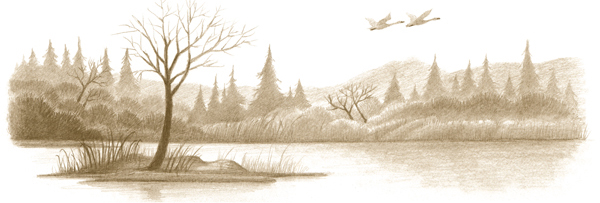
THE POND Sam had discovered on that spring morning was seldom visited by any human being. All winter, snow had covered the ice; the pond lay cold and still under its white blanket. Most of the time there wasn’t a sound to be heard. The frog was asleep. The chipmunk was asleep. Occasionally a jay would cry out. And sometimes at night the fox would bark—a high, rasping bark. Winter seemed to last forever.
But one day a change came over the woods and the pond. Warm air, soft and kind, blew through the trees. The ice, which had softened during the night, began to melt. Patches of open water appeared. All the creatures that lived in the pond and in the woods were glad to feel the warmth. They heard and felt the breath of spring, and they stirred with new life and hope. There was a good, new smell in the air, a smell of earth waking after its long sleep. The frog, buried in the mud at the bottom of the pond, knew that spring was here. The chickadee knew and was delighted (almost everything delights a chickadee). The vixen, dozing in her den, knew she would soon have cubs. Every creature knew that a better, easier time was at hand—warmer days, pleasanter nights. Trees were putting out green buds; the buds were swelling. Birds began arriving from the south. A pair of ducks flew in. The Red-winged Blackbird arrived and scouted the pond for nesting sites. A small sparrow with a white throat arrived and sang, “Oh, sweet Canada, Canada, Canada!”
And if you had been sitting by the pond on that first warm day of spring, suddenly, toward the end of the afternoon, you would have heard a stirring sound high above you in the air—a sound like the sound of trumpets.
“Ko-hoh, ko-hoh!”
And if you had looked up, you would have seen, high overhead, two great white birds. They flew swiftly, their legs stretched out straight behind, their long white necks stretched out ahead, their powerful wings beating steady and strong. “Ko-hoh, ko-hoh, ko-hoh!” A thrilling noise in the sky, the trumpeting of swans.
When the birds spotted the pond, they began circling, looking the place over from the air. Then they glided down and came to rest in the water, folding their long wings neatly along their sides and turning their heads this way and that to study their new surroundings. They were Trumpeter Swans, pure white birds with black bills. They had liked the looks of the swampy pond and had decided to make it their home for a while and raise a family.
The two swans were tired from the long flight. They were glad to be down out of the sky. They paddled slowly about and then began feeding, thrusting their necks into the shallow water and pulling roots and plants from the bottom. Everything about the swans was white except their bills and their feet; these were black. They carried their heads high. The pond seemed a different place because of their arrival.
For the next few days, the swans rested. When they were hungry, they ate. When they were thirsty—which was a great deal of the time—they drank. On the tenth day, the female began looking around to find a place to build her nest.
In the spring of the year, nest-building is uppermost in a bird’s mind: it is the most important thing there is. If she picks a good place, she stands a good chance of hatching her eggs and rearing her young. If she picks a poor place, she may fail to raise a family. The female swan knew this; she knew the decision she was making was extremely important.
The two swans first investigated the upper end of the pond, where a stream flowed slowly in. It was pleasant there, with reeds and bulrushes. Red-winged Blackbirds were busy nesting in this part of the pond, and a pair of Mallard Ducks were courting. Then the swans swam to the lower end of the pond, a marsh with woods on one side and a deer meadow on the other. It was lonely here. From one shore, a point of land extended out into the pond. It was a sandy strip, like a little peninsula. And at the tip of it, a few feet out into the water, was a tiny island, hardly bigger than a dining table. One small tree grew on the island, and there were rocks and ferns and grasses.
“Take a look at this!” exclaimed the female, as she swam round and around.
“Ko-hoh!” replied her husband, who liked to have someone ask his advice.
The swan stepped cautiously out on to the island. The spot seemed made to order—just right for a nesting place. While the male swan floated close by, watching, she snooped about until she found a pleasant spot on the ground. She sat down, to see how it felt to be sitting there. She decided it was the right size for her body. It was nicely located, a couple of feet from the water’s edge. Very convenient. She turned to her husband.
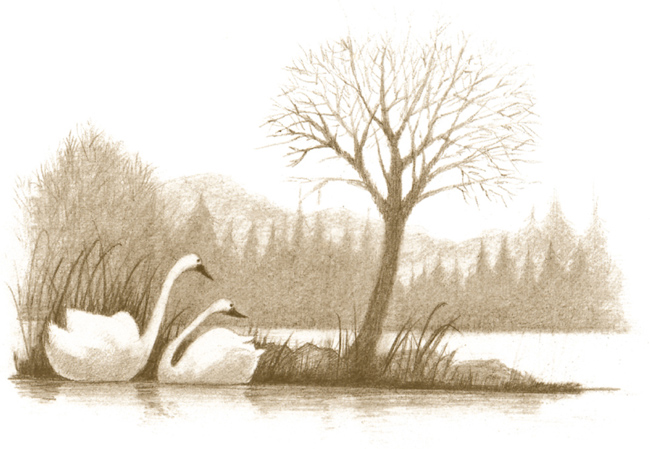
“What do you think?” she said.
“An ideal location!” he replied. “A perfect place! And I will tell you why it’s a perfect place,” he continued, majestically. “If an enemy—a fox or a coon or a coyote or a skunk—wanted to reach this spot with murder in his heart, he’d have to enter the water and get wet. And before he could enter the water, he’d have to walk the whole length of that point of land. And by that time we’d see him or hear him, and I would give him a hard time.”
The male stretched out his great wings, eight feet from tip to tip, and gave the water a mighty clout to show his strength. This made him feel better right away. When a Trumpeter Swan hits an enemy with his wing, it is like being hit by a baseball bat. A male swan, by the way, is called a “cob.” No one knows why, but that’s what he’s called. A good many animals have special names: a male goose is called a gander, a male cow is called a bull, a male sheep is called a ram, a male chicken is called a rooster, and so on. Anyway, the thing to remember is that a male swan is called a cob.
The cob’s wife pretended not to notice that her husband was showing off, but she saw it, all right, and she was proud of his strength and his courage. As husbands go, he was a good one.
The cob watched his beautiful wife sitting there on the tiny island. To his great joy, he saw her begin to turn slowly round and around, keeping always in the same spot, treading the mud and grass. She was making the first motions of nesting. First she squatted down in the place she had chosen. Then she twisted round and around, tamping the earth with her broad webbed feet, hollowing it out to make it like a saucer. Then she reached out and pulled twigs and grasses toward her and dropped them at her sides and under her tail, shaping the nest to her body.
The cob floated close to his mate. He studied every move she made.
“Now another medium-sized stick, my love,” he said. And she poked her splendid long white graceful neck as far as it would go, picked up a stick, and placed it at her side.
“Now another bit of coarse grass,” said the cob, with great dignity.
The female reached for grasses, for moss, for twigs—anything that was handy. Slowly, carefully, she built up the nest until she was sitting on a big grassy mound. She worked at the task for a couple of hours, then knocked off for the day and slid into the pond again, to take a drink and have lunch.
“A fine start!” said the cob, as he gazed back at the nest. “A perfect beginning! I don’t know how you manage it so cleverly.”
“It comes naturally,” replied his wife. “There’s a lot of work to it, but on the whole it is pleasant work.”
“Yes,” said the cob. “And when you’re done, you have something to show for your trouble—you have a swan’s nest, six feet across. What other bird can say that?”
“Well,” said his wife, “maybe an eagle can say it.”
“Yes, but in that case it wouldn’t be a swan’s nest, it would be an eagle’s nest, and it would be high up in some old dead tree somewhere, instead of right down near the water, with all the conveniences that go with water.”
They both laughed at this. Then they began trumpeting and splashing and scooping up water and throwing it on their backs, darting about as though they had suddenly gone crazy with delight.
“Ko-hoh! Ko-hoh! Ko-hoh!” they cried.
Every wild creature within a mile and a half of the pond heard the trumpeting of the swans. The fox heard, the raccoon heard, the skunk heard. One pair of ears heard that did not belong to a wild creature. But the swans did not know that.
Конец ознакомительного фрагмента.
Текст предоставлен ООО «ЛитРес».
Прочитайте эту книгу целиком, купив полную легальную версию на ЛитРес.
Безопасно оплатить книгу можно банковской картой Visa, MasterCard, Maestro, со счета мобильного телефона, с платежного терминала, в салоне МТС или Связной, через PayPal, WebMoney, Яндекс.Деньги, QIWI Кошелек, бонусными картами или другим удобным Вам способом.


